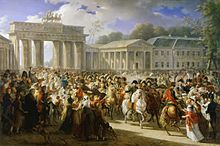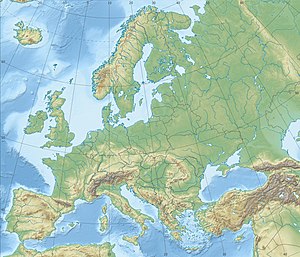Fall of Berlin (1806)
| Fall of Berlin | |||||||
|---|---|---|---|---|---|---|---|
| Part of The War of the Fourth Coalition | |||||||
 Napoleon entering Berlin with the Brandenburg Gate in the background. | |||||||
| |||||||
| Belligerents | |||||||
|
|
| ||||||
| Commanders and leaders | |||||||
|
| |||||||
Location within Europe | |||||||
The Fall of Berlin took place on 27 October 1806 when the Prussian capital of Berlin was captured by French forces in the aftermath of the Battle of Jena–Auerstedt. The Emperor of the French Napoleon Bonaparte entered the city, from which he issued his Berlin Decree implementing his Continental System. Large-scale plundering of Berlin took place.[1]
Occupation
The Prussian forces and their King Frederick William III fled eastwards to Königsberg in East Prussia to continue resistance
Aftermath
The subsequent Battle of Eylau, the Battle of Friedland and the Treaty of Tilsit compelled Prussia to cede large portions of its territories and accept French garrisons in its major fortresses and settlements. Prussia became a client state of France, forced to pay large indemnities, and Berlin itself remained occupied until early 1813. A garrison was also established at the nearby Spandau Citadel.
Following Napoleon's Retreat from Moscow in 1812, Prussian forces serving as auxiliaries for the French switched sides and supported Russia. This combined with major uprisings across Prussian territory, forcing French troops to retreat and abandon Berlin. The city then became a major target for the French who attempted to recapture it during the German Campaign of 1813, ending only with the complete French withdrawal following the Battle of Leipzig.[1]
Impact
Although Berlin had previously briefly been raided two times during the Seven Years' War, its occupation was a major blow to the Prussian leadership. It destroyed the reputation the Prussian Army had gained during the days of Frederick the Great. After arriving in Berlin, Napoleon visited the tomb of Frederick and is reported to have said to his marshals "Hats off gentlemen, if he were alive we wouldn’t be here today". This became an iconic scene in German culture, portrayed in Prussian films such as Old Fritz (1927) and Kolberg (1945).[2]
In the wake of the fall of Berlin, a major reform movement was launched to restore the fighting effectiveness of the Prussian Army and renew the nation at large in order to plan a war of revenge against France.[3] The reformed Prussian forces playing a key role in the subsequent French retreat from Germany in 1813-14, and during Napoleon's final defeat during the Waterloo Campaign in 1815.
Notes
- ^ a b Leggiere 2002, p. 19.
- ^ Schulte-Sasse 1996, p. 111.
- ^ Carr & Hearder 2014, p. 11.
References
- Carr, William; Hearder, Harry (2014). The Wars of German Unification 1864 - 1871. Routledge.
- Leggiere, Michael V. (2002). Napoleon and Berlin: The Franco-Prussian War in North Germany, 1813. University of Oklahoma Press.
- Schulte-Sasse, Linda (1996). Entertaining the Third Reich: Illusions of Wholeness in Nazi Cinema. Duke University Press.
Further reading
- Chandler, David (1993). Jena 1806: Napoleon destroys Prussia. Bloomsbury.
- Roberts, Andrew (2014). Napoleon the Great. Penguin.
External links
 Media related to Fall of Berlin (1806) at Wikimedia Commons
Media related to Fall of Berlin (1806) at Wikimedia Commons


